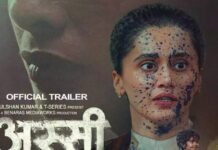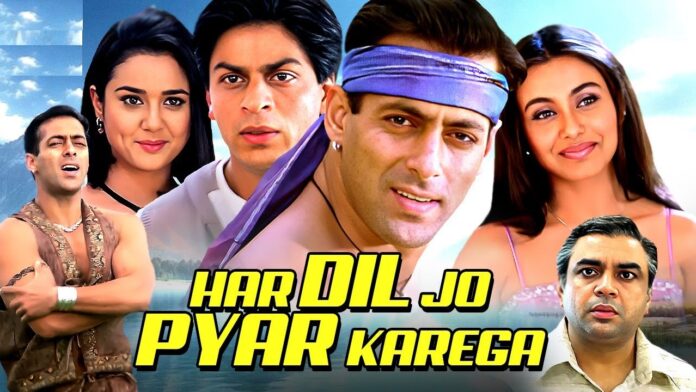HAR DIL JO PYAR KAREGA
Nadiadwala Grandson Entertainment’s Har Dil Jo Pyar Karega is a love triangle inspired from the Hollywood film, While You Were Sleeping. An aspiring singer (Salman Khan) is pushed into a situation where he is assumed to be an accident victim’s (Rani Mukerji’s) husband. Soon, he realises the benefits of posing as her husband. The accident victim, who has slipped into a coma, has a foster-sister (Preity Zinta) whom the guy soon falls in love with. The families of the two girls, including the sister, treat the guy as the coma victim’s husband and dote on him for saving the girl’s life. As days progress, the sister learns the truth and she, too, starts loving the guy. In the meantime, the other girl comes out of the coma and starts loving her saviour. The guy is caught between the two girls and finds his beloved withdrawing as a gesture of sacrifice for her sister who has just recovered from the accident and coma. The climax has misunderstandings being cleared and issues being resolved.
A good story-line has been embellished with excellent visuals, pretty costumes, eye-catching locales, hit music and extraordinary choreography. But the screenplay is not flawless. The first half has hardly any movement, and emphasis has been laid on comedy punches to further the drama. Some punches are entertaining while others are irritating. Showing one heroine in a coma for several reels tests the audience’s patience. Although Salman poses as Rani’s husband, the real person of that name has simply not been shown in the entire film! Suspenses are revealed rather amateurishly — for instance, Preity gets to know of Salman’s real identity by chance.
The first half is just about fair. It will be liked by youngsters. One major reason for this is that while Rani makes her first appearance (that too, in a coma, and she remains in the comatose state for a long time!) after almost half an hour of the film’s start, the other heroine — Preity — comes on the scene even later than that. The second half has more movement and even though it has its lows, it does keep audience interest alive throughout. The last few reels of sacrifices will appeal to the womenfolk. Although the director has tried to infuse emotions, they do not touch the heart. Even then, the magic of the climax works on the viewer, if only for the drama — the religious touch, two sisters dying to sacrifice for each other, resolution of the problem etc. The film’s treatment reminds of Kunwara, Hum Aapke Hain Koun..!, Dil To Pagal Hai.
Salman Khan looks extremely handsome and sheds off more clothes than in his earlier films. He acts well too but his crazy comedy will be liked by only half the audience, the other half are bound to find it irritating. His dances are superb. Preity Zinta looks glamorous and shines in emotional scenes. Rani Mukerji gets lesser scope but is quite impressive in the last few reels. Shakti Kapoor’s comedy, especially the electric shock sequence and the juice stall-bus-stop episode, is very entertaining. He does a splendid job and may draw a round of applause for his surprising entry in the climax. Paresh Rawal is very natural. Neeraj Vora raises laughter at places and bores at others. Satish Shah is very good. Razzak Khan, too, entertains. Kamini Kaushal, Rajiv Verma, Ajit Vachchani, Shashi Kiran, Asrani (special appearance), K.D. Chandran, Vinay Pathak, baby Sana, master Smith Seth, Rekha Rao and Bhairav Aru lend good support. Shah Rukh Khan springs a pleasant surprise at interval point and keeps the audience guessing all through the interval. In fact, the interval point is superb simply for his presence. But his re-appearance in the end is unnecessary and worthless.
Raj Kanwar has lent his directorial touches at places but he has not been able to hold the film together at several points. Salman Khan’s squeaking and comedy look out of place at times. Music (Anu Malik) is excellent. ‘Piya piya’ and the title song are superb and their picturisations (Farah Khan) are heavenly. Picturisation of ‘Ek garam chai’, ‘Dil dil deewana’ and ‘Aisa pehli baar’ are also superb. In fact, it must be mentioned that Farah Khan has a brilliant visual sense and her choreography complements the music score splendidly. The ‘Aate jaate’ song needs to be deleted as it slackens the pace and is a walk-out item. W.B. Rao’s camerawork is marvellous. Sets (Sharmishtha Roy) are breathtaking. Editing is good. Titles are novel and will be an attraction.
On the whole, Har Dil Jo Pyar Karega has not just taken a flying start but it also has music, colour, visual appeal, a bit of ladies appeal and a different story to emerge a plus fare on the strength of patronage of youth and women. Business in Bombay and South will be much better. Drawbacks of a loose screenplay and lack of control over the hero’s performance in several scenes make the film look disjointed at places and will hinder its long run.
Released on 4-8-2000 at Metro and 22 other cinemas of Bombay thru Raj Enterprises. Publicity & opening: extraordinary. …….Also released all over. Opening was bumper everywhere. 1st day Jaipur 3,65,509/- from 5 cinemas! Some shows at some centres in various circuits were cancelled owing to bandh on Friday.
DR. RAJKUMAR STILL IN VEERAPPAN’S CUSTODY
Dr. Rajkumar, the most idolised veteran superstar of Kannada films, was kidnapped by the notorious sandalwood smuggler and forest brigand, Veerappan, from the star’s farmhouse in Gajanur village in Tamil Nadu on the night of July 31. Tension gripped Bangalore and other places in Karnataka as soon as the news of the kidnapping was aired the following day. Before kidnapping the veteran actor, the bandits handed over an audio cassette to his wife, Parvathamma, and asked her to deliver it to Karnataka chief minister S.M. Krishna. The Karnataka CM and Tamil Nadu CM, M. Karunanidhi, have sent an emissary, R.R. Gopal, editor of Tamil magazine Nakkeeran, as he is the only person to have access to the ever-evasive Veerappan.
In a departure from the norm and in view of high anxiety, the All India Radio, Bangalore and Madras, have granted free airtime to the veteran actor’s family to communicate their feelings to the family head and to make frequent appeals to Veerappan to release the actor who is 73 and not keeping good health. The actor’s family is also broadcasting the names of the medicines he is supposed to take regularly, as Veerappan did not take Rajkumar’s medicines with him.
According to last night’s news, Dr. Rajkumar has got sent an audio cassette to the Karnataka CM, conveying that he was in good health and that there was no danger to his life since “Veerappan is a good man”. He has appealed to the CM to concede to the brigand’s demand as they were “justified”.
AN EVENING OF MADAN MOHAN’S MUSIC
The Madan Mohan family organised an evening of their father’s music on 14th July in Bombay to commemorate his 25th death anniversary. The function was attended by members of the film and music industry and those who were close to Madan Mohan. Among those who were special guests of the evening were Lata Mangeshkar, Asha Bhosle, Khayyam, Jagjit Singh, Chitra Singh, Alka Yagnik, Mahendra Kapoor, Nitin Mukesh, Alisha Chinai, Jatin and Lalit, Bhupen Hazarika, Talat Aziz, Bhupinder and Mitalee Singh, Sudesh Bhosle, Anand Bakshi, Uttam Singh, Rajendra Mehta and Nina Mehta, Shivkumar Sharma, Yash Chopra, Yash Johar, Aditya Chopra, Mohan Kumar, Kalpana Lajmi and Ameen Sayani.
A half-hour film, featuring Madan Mohan’s compositions, was screened on the occasion. A 5-cassette pack, ‘Legends – Madan Mohan’, was formally released by Lata Mangeshkar and Yash Chopra at the function. The cassette has been brought out by HMV.
BOOK ON B.R. CHOPRA
To commemorate the illustrious life and work of Dr. B.R. Chopra, Arun H. Puranik and B.R. Vyas are bringing out a rare book on the living legend of Indian cinema. It contains little-known facts about the filmmaker with rare photographs and messages from his friends and fans. The book will be released formally at a function to be held shortly in Bombay.
VETERAN FILM EDITOR BIMAL ROY BIDS ADIEU
Veteran film editor Bimal Roy passed away on 29th July at Ahmednagar. He had not been well for some time and had been admitted to a local hospital. He was 75 and is survived by his wife and a daughter.
Bimal Roy started his career with Kamal Amrohi’s Mahal in 1944 and worked for 50 years as a well-known editor. He worked with directors like Gyan Mukherji, Nitin Bose and Dulal Guha, and edited films which include Jwar Bhata, Deedar, Kalpana, Ragini, Mere Jeevan Sathi, Pratiggya, Kala Sona, Do Anjaane, Dost, Dushman, Zalzala and Ab Insaaf Hoga. After retirement, he went to Ahmednagar where he breathed his last.
7 DAYS’ ADVANCE BOOKING BEGINS IN AURANGABAD
Advance booking for the entire week commenced at Goldie cinema in Aurangabad this week with Har Dil Jo Pyar Karega. This is the first time that a cinema in Aurangabad has done advance booking for 7 days. Goldie opened seven advance booking counters in the city and the audience response was fantastic. All shows were full on Friday.
Deepak Jawaharani of Goldie will soon also begin internet booking for his cinema. Pukar recently completed a silver jubilee run at the cinema.
* * *
KN…PH celebrated silver jubilee a few weeks back at Abhineet cinema, Aurangabad. The cinema has Dobly SR sound system.
ALI SARDAR JAFRI DEAD
The greatest Urdu poet of our times, Ali Sardar Jafri, died in Bombay on 1st August. He was 86 and has left behind his wife.
The poet had been bed-ridden since April this year, and was suffering from brain tumour. The burial ceremony of the ‘perfect literal-democrat’ was performed the same day, at which representatives of the Film Writers Association and the Federation of Western India Cine Employees were present.
Ali Sardar Jafri was one of the founder-members of the progressive movement in India in 1935-36. As a freedom fighter, he spent many years in jail. He was honoured with many awards including the Jnanpith award, the Iqbal Samman of the Madhya Pradesh government, and the Padma Shri. He was among the few who accompanied prime minister Atal Bihari Vajpayee a while ago in his bus journey to Pakistan.
Paying their respects of the great litterateur who produced K.A. Abbas’ Gyarah Hazar Ladkiyan, wrote the script of Sohni Mahiwal (1946) and the lyrics, Sham-e-gham ki kasam (Footpath), Javed Akhtar said, “His death is a loss not only for Urdu literature, but also for the nation. He was a member of the shrinking clan of firm believers in social justice, secularism, equality and the liberal doctrine — ideals he preached and fought for all through his life. He used his poetry as a weapon against reactionary forces.” Nida Fazli, who edited the magazine Guftgoo with Ali Sardar Jafri, said, “Ali Sardar Jafri was a multi-faceted personality, a poet, writer, intellectual, fiction writer and documentary filmmaker, all rolled into one. He was a major poet of our times.”
OWNER OF RADHA, BHOPAL PASSES AWAY
Komal Singh Rathor, proprietor of Radha Cinema, Bhopal, passed away on 1st August in Bhopal. He is survived by his wife, two sons and two daughters. The funeral was attended by all the exhibitors of Bhopal. Radha Cinema remained closed for three days.
DOLBY DIGITAL AT SANGAM, BHOPAL
Sangam Cinema, Bhopal has been equipped with Dolby digital sound system. It has been commissioned with the release of Har Dil Jo Pyar Karega on 4th August.
‘DEEWANE’ BASH LARGELY ATTENDED
A showcase of Harry Baweja’s Deewane was screened for the media at a largely-attended party held on 1st August at Hotel Sun-N-Sand, Bombay. Among those who attended the party were the film’s lead pair, Ajay Devgan and Urmila Matondkar (Mahima Chaudhry could not attend as she was in Mauritius for the shooting of Mastana), Prakash Mehra, Manmohan Shetty, the Tauranis of Tips and many distributors and exhibitors of Bombay.
BABY GIRL FOR LAXMIKANT, PRIYA
Actor Laxmikant Berde and his actress-wife Priya (Arun) were blessed with a daughter on July 27.
YOU ASKED IT
How many completed Hindi films are lying ready today?
– More than five hundred, of which half are in various stages of post-production. The rest are lying on the racks of various labs. Add to these, a large number of dubbed films!
– Has the kidnapping of Kannada superstar Rajkumar by Veerappan perked up the collections of Ram Gopal Varma’s Jungle?
– Not really! In JUNGLE, Urmila Matondkar does not play a film star, therefore, the parallel cannot be drawn so easily. Nor is it obvious that the sandalwood smuggler in the film is based on the character of Veerappan.
How far is it true that Hrithik Roshan has been signed for a Hollywood film?
– Hrithik had been approached to play Hamlet, but the makers wanted immediate dates which the actor couldn’t give. So he has not as yet consented to do any Hollywood film.
DO YOU KNOW?
* A record number of 33 prints of HAR DIL JO PYAR KAREGA have been taken out by the C.P. Berar distributors. On Thursday (3rd August), a mobile van was inaugurated in Nagpur with HDJPK. The film had evinced bumper response at the advance booking windows in Nagpur, Amravati and Akola.
* Though Dada Kondke, the uncrowned king of comedy of Marathi films, is no more, he has left behind a legacy of immortal comedy. This was once again proved by his MUKA GHYA MUKA in which he played a dumb character. The film ran to packed houses at Prabhat, Pune despite many repeat-run screenings in the city. In the previous two weeks at the same cinema, Dada Kondke’s ANDHALA MARTOY DOLA fared exceptionally well despite civic unrest in the city and power problems.
* KN…PH has created a city record by collecting a total of 2,16,131/- in 3 weeks at Goyal, Kamptee.
ANNOUNCEMENT & LAUNCHING
Tabu-Atul Starrer ‘Chandni Bar’
Shlok Films’ Chandni Bar, starring Tabu and Atul Kulkarni, will be launched with a muhurt on Aug. 7. Being produced by Mrs. R. Mohan and directed by Madhur Bhandarkar from his own story, the film co-stars Srivallabh Vyas, Rajpal Yadav, Vinay Apte, Abhay Bhargav, Preeti Khare, Vaarun Vaardaan, Ananya and Suhas Palshikar. It has screenplay by Mohan Azad, dialogues by Masood Mirza, cinematography by Rajeev Ravi, choreography by Kishore Oreshkar, and art by Prasanna and Yashwant Patil.
PRODUCTION NEWS
Subhash Ghai Films Song On Hrithik, Kareena For ‘Yaadein’
Director Subhash Ghai picturised a song on lead pair Hrithik Roshan and Kareena Kapoor for Mukta Arts Ltd.’s Yaadein during its first Bombay schedule held from July 20 to 25 at Filmistan Studios. The film’s next shooting schedule will be held in Bombay and Rajasthan from Aug. 6 to 21. Jackie Shroff will participate along with the lead pair. Being produced by Ashok Ghai, the film has music by Anu Malik, and lyrics by Anand Bakshi. Kabir Lal is the cinematographer, and Sharmishtha Roy, its art director.
‘Mastana’ In Mauritius
The unit of United Films Combines’ Mastana left for Mauritius on July 31 for the last 15-day shooting stint. Two songs and scenes are being picturised on Govinda, Mahima Chaudhry, Jackie Shroff, Arun Govil, Jaspal Bhatti, Anjan Srivastava, Tiku Talsania, Avtar Gill, Upasna Singh and one more heroine in a special appearance, who will join the unit (for a song picturisation) later during the stint. The film is being produced by Vasant Doshi and directed by Parto Ghosh. Writer: Ranbir Pushp. Music: Rajesh Roshan. Lyrics: Maya Govind, Ibrahim Ashq and Nitin Raikwar. Dances: Rekha Chinni Prakash and Ganesh Acharya. Cinematographer: Sameer Reddy. Executive producer: Kamlesh Doshi.
20-Day Shooting Spell Of ‘Raju Chacha’ In HP
Devgan’s Films’ Raju Chacha will be shot in a 20-day schedule from August 16 at Simla and various locations in Himachal Pradesh. Anil Degvan, who directs the film, will picturise three songs and scenes. The entire cast, comprising Rishi Kapoor, Ajay Devgan, Kajol, Govind Namdev, Shahbaaz Khan, Smita Jayakar, Pramod Moutho, Tiku Talsania, Usha Bachani, Anil Nagrath, Navin Bawa, Adi Irani and Johny Lever, with four child artistes, Harsh Lunia, Hanshuk Vaidya, Sakshi Sen and Kewal Chadda, will participate. The film is being produced by Veeru Devgan. Story: Anees Bazmee. Screenplay: Robin Bhatt. Dialogues: Javed Siddiqi. Music: Jatin Lalit. Lyrics: Anand Bakshi. Action: Jai Singh. Choreography: Raju Khan. Cinematography: Nirmal Jani. Executive producer: Kumar Mangat. Bharat Shah presents the film.
CENSOR NEWS
S.P. Creations’ Deewane (social) was given C.C. No. CIL/2/24/2000 (UA) dt. 31-7-2000; length 4704.68 metres in 17 reels (cuts: 5.11 metres).
Venus Records & Tapes’ Dhadkan (social), applied on 28th and seen on 31st, has been issued C.C. No. CIL/1/44/2000 (U) dt. 1-8-2000; length 4579.05 metres in 18 reels (no cut).
Titwala Filmwalas’ Justice Chowdhary (crime), applied on 28th and seen on 31st, has been issued C.C. No. CIL/3/76/2000 (A) dt. 1-8-2000; length 3037.91 metres in 16 reels (cuts: 174.13 metres).
Bhagat Films Production’s Bijlee (social) was given C.C. No. CIL/3/75/2000 (A) dt. 28-7-2000; length 3174.11 metres in 13 reels (cuts: 29.66 metres).
SPE Films’ Jaan Hatheli Pe (dubbed; adventure/thriller) was given C.C. No. CIL/3/112/2000 (A) dt. 2-8-2000; length 3179.84 metres in 7 reels (no cut).
REGIONAL FILMS
Maa Movies International’s Saajan Haiye Saambhrey (Gujarati; social) was given C.C. No. CIL/1/45/2000 (U) dt. 2-8-2000; length 4497.94 metres in 16 reels (cuts: 25.18 metres).
Pan Music & Magazines Ltd.’s Vuyrin Vuyirae (Tamil; dubbed; social) was given C.C. No. CIL/2/21/2000 (UA) dt. 28-7-2000; length 4359.72 metres in 17 reels (no cut); Neemanasu Naamanasu (Telugu; dubbed; social) was given C.C. No. CIL/2/22/2000 (UA) dt. 28-7-2000; length 4359.72 metres in 17 reels (no cut); Ithukathaiyalla (Malayalam; dubbed; social) was given C.C. No. CIL/2/23/2000 (UA) dt. 27-7-2000; length 4359.72 metres in 17 reels (no cut).
Rahul Rohan Production’s Tari Mehndi Mare Haath (Gujarati), seen on 31st, has been passed with U certificate, with cuts.
K. Movies’ Sajan Vina Suno Sansar (Gujarati) was seen on 28th.
3-E
Education-Entertainment-Enlightenment
Abhishek — Positive, Sure, Confident!
These days, when film companies and television software production houses are going public, producer Vashu Bhagnani, too, went public on 2nd August — but in his own musical way! He got screened the three songs and promotional trailers of his Tera Jadoo Chal Gayaa for the public as well as the media through two big screens put up on the street outside Hotel Ramada Inn, Juhu, Bombay. The screenings were followed by a press meet with the film’s lead man, Abhishek Bachchan, and the unit members. The young actor fielded every query with a rare equanimity and sounded — to borrow from dad Amitabh Bachchan’s TV show, Kaun Banega Crorepati — “positive”, “confident” and “sure” of his performance in Vashu’s film.
Khooni On The Prowl
There are not one or two or four but eight completed films with titles bearing the word ‘Khooni’: Khooni Bistar, Khooni Chehra, Khooni Hostel, Khooni Ladki, Khooni Mahal, Khooni Sayaa, Khooni Shikunja and Khooni Tantrik. All these films are complete and are awaiting release. And there is one more, Khooni Aatma, which is under-production. There may be many more ‘bloody’ titles to come!
Flop 4 U
Ram Gopal Varma and four-letter words don’t go together. Now, that doesn’t mean that this producer-director doesn’t like to mouth gaalis (four-letter words). It just means that four-lettered titles of his films end up in a four-letter result: F-L-O-P. There are four instances to prove this unhappy fact: Raat, Daud, Kaun and Mast. So, four-letter titles are actually almost four-letter words for Ramu!
INFORMATION MEETS
“Our biggest care is our customer… Our focus will always remain customer choice and market viability.”
– SUBHASH GHAI
RAJ VAIDYA
For a man without a film background or a film family to support him, Subhash Ghai has come a long way. From being a small-time actor to a writer’s assistant to a big-time producer-director and, now, the chief of Hindi film industry’s first filmmaking company to go in for an IPO (initial public offering), Ghai has seen it all. His films, whether Ram Lakhan or Hero, Saudagar or Taal, have been spectacles. His music has mesmerised millions across the world. But that’s just the end result. Not many are aware of the hard work the man puts in to churn out such exciting fare for the audience. He works like a man possessed! His enthusiasm and passion for his films is never-ending. That’s, perhaps, the reason why the man is so charged, whether it is the launching for his film in London or a day of recording at Sound City, shooting at Filmistan Studios, a story sitting in his office or an editing stint at his Audeus. Endowed with a sharp memory (so next time, he says, “Oh! I forgot”, don’t believe him!) and an extremely keen sense of observation (be careful, he could do a lovely take-off on you!!), Ghai is now all set to take on the corporate world as head honcho of Mukta Arts Ltd. In this interview, taken over breakfast, he talks of going public, of his private likes and dislikes, of Yaadein, of plans of other things. Excerpts:
From scripts to scrips and from entertaining public to going public, how has the change been?
Scripts are primarily written to be sold. One produces, another directs, while still others engage in the business of films. From scripts to scrips is a journey to finally reach the market. It is the business of creativity created by creative people. Films are, after all, creative products. If you look at the works of Michael Jackson and Steven Spielberg, you will see that being commercial doesn’t affect their creativity in any way. They have successfully created a model business out of their creativity.
Still, there is the risk of one’s creativity getting bogged down by the burden to be answerable to the public?
Finally, business is a commercial art. You have to know both, business and art, equally. I have been in this business in both capacities — of a producer and a director. And never once did the producer affect the director in me…
…But surely, there must’ve been times when there were differences between the two…
…Never! You see, I was asked the same thing in ’78 when I turned a producer with Karz and Hero. A lot of people in the trade advised me against turning a producer. They said, “You have a successful track-record as a director. Why do you want to burden your creativity with the extra headache of becoming a producer?” But I was determined. As a producer, I created a model system to aid the director in me. Thus, when I launched Mukta Arts, I had the system in place, the people in place. I had decentralised from the very beginning, in an effort to create an ideal environment for my creativity to grow. When you have your own company, it is possible to mould it to suit your own creative needs.
The general perception is that you are now richer by 100 crore.
Yes, I know, but this is a totally wrong perception. The 100 crore Mukta Arts has got is not its income, it is finance given to the company by the public which expects Mukta Arts to perform, to grow and to give it returns on its Rs. 100 crore, in the form of dividends.
Star-sittings and music-sittings will now go alongside board meetings and general body meetings. For any creative person, while the sittings can be a pleasant experience, the meetings can be painful. Have you thought of how you will cope with them?
This is a general fear in the minds of the public and the film trade. However, I find that it is a misplaced fear. To give you an instance, I used to attend the Mukta Arts office only once during the week — except during the release period. In that one day, everything was checked, designed, executed and supervised. I believe, nothing is painful if you do it honestly and sincerely, and come out with good results. So, coming back to your question, all I would say is that sitting in board meetings and AGMs (annual general meetings) is as good as sitting on your business desk — something that I’ve been doing for the past 21 years.
Any parallels between directing a public entertainer and going public?
It is nearly the same. Except, whereas previously, our investors were film financiers, distributors and exhibitors, today, it is the public. Therefore, the volume of investment is larger. However, we still have to carry out the growth and expansion of our business with the same core competency. Which is why we haven’t adopted a vertical business model. We are going to be public entertainers, for the public.
What additional duties will going public entail upon you?
Performing regularly rather than lazing around and taking your own time. Achieving sustainability and credibility. Making the company of an international size and standard is our target. If the company continues to perform well, we shall achieve that target. Vision, wisdom and an excellent team are what you need in order to succeed in your goals.
In any public company, a second line is a must. But Mukta Arts has no second line after you. Are you thinking of building a second line?
Our proposed film and television institute will do just that. It will not only create a second line creative talent to Mukta Arts, but to the entire film industry. The top talent products of the institute will not remain merely students and employees, but will be given an opportunity to become the shareholders of Mukta Arts. Founder Sam Goldwyn may not be alive today, but MGM still exists as an institution. Likewise, we are aiming to create an environment for all talented people to showcase their best in the best possible manner. We will provide them with the opportunity to learn the best and earn the best.
What are the immediate plans of Mukta Arts Ltd.?
Well, we are going full steam ahead to complete Yaadein at the moment. Moreover, very soon, we will be starting two films — one each with Prakash Jha and Joy Augustine at the helm. Then, we are also entering into a co-production with Kapoor & Kaushik Entertainment (the name of the production concern of Anil Kapoor and Satish Kaushik) from 9th August. There are some other plans also, but I am not supposed to tell you about them till we perform.
How do you propose keeping pace with the age of internet?
I personally spend a large part of my leisure time being on the internet to keep myself abreast of the latest development in IT. Our production and direction teams are logged on 24 hours. We already have a website — www.muktaarts.com — and we are in the process of developing a portal concerning all the related activities of Mukta Arts.
You intend to start a film institute. Any progress?
The process of acquiring land for the institute, designing the complex, building affiliations with various international institutions, creating the faculty etc. has been on for the last 10 months. The institute, which will be located in Bombay itself, will conduct courses in all related areas in the art and science of filmmaking as well as television. Hopefully, it will have its own shape by next year and will begin bringing in results in three years’ time. The courses at the institute will include screenplay-writing, direction, acting, dance choreography, grooming and fashion technology, make-up, animation, special effects and all other technical courses. The institute itself is being designed along the lines of the international model of institutions.
How will Mukta Arts reach the projected turnover and profitability for the first year?
Through the sale of existing software, the deals for which have already been finalised with B4U and others; hiring of hardware services (both, existing and new hardware); release of one small-budget film before the year-end; music album, which is already in the making; television software, which may or may not generate revenue this year; and other existing revenue-generating sources.
So far, Mukta Arts and Subhash Ghai have been synonymous with one another. But now that your company will be hiring other directors, have you thought that the response of distributors may not be as overwhelming as earlier?
Distributors value the price of the whole project in terms of (a) banner, (b) director, and (c) star cast. Naturally, the name of the director and the star cast result in fluctuation of the price-line. Hence the distributors prefer to rather repose their trust in those banners which can produce movies in time, in budget and of quality. Our film with Prakash Jha is basically the story of a child and will be made within a small budget and with a lot of commercial potential. It could prove a bigger hit than a blockbuster, couldn’t it?
Have you studied the example of GV, the first film company to have gone public some years back? Any lessons learnt from it or from ABCL?
G. Venkateshwaran was our Madras distributor for Karz in 1980. He has been running a business house which mainly trades in movies which include a few Tamil movies, too. On the other hand, we are a major production house having some joint ventures in film distribution. Today, more and more corporate houses, having realised the future potential of the entertainment industry, are setting up their own divisions for films. Whereas we have been actively producing movies for the past 21 years. In truest terms, we are a performing unit with a proven track-record of over two decades.
With going public comes decentralisation. Will you be able to adapt yourself to dictation from outsiders?
Decentralisation as a system has long been prevailing at Mukta Arts. We have put together an efficient team of people to head various departments. Ashok Ghai heads our production division; Raju Farooqui, studios; Parvez Farooqui, law and finance; and Sudesh Gupta, who is our business executive, heading business and marketing. So, we already have a system of independent decision-making prevalent.
As far as taking suggestions from others is concerned, our biggest care is our customer. We will listen to everyone, but our focus will always remain customer choice and market viability.
How do you justify the high premium of Rs. 160 per share of your company?
The response from the investors has been overwhelming, be it the book-building or the fixed price public issue. They have not only reposed their faith in Subhash Ghai but have also validated the fundamentals of the company’s performance yesterday, today and tomorrow. On our part, we decided neither to overvalue nor to undervalue ourselves. I only told my merchant banker two things — to be very fair to our investors and to plan for tomorrow’s profitability rather than today’s earnings. We do not believe in short-term approach. That is why, even though it was a good time in February-March, we did not increase our price. Likewise, we did not lower our price in a comparatively worse market stretch of today. People have trusted us and we are committed to perform.
What will the USP of Mukta Arts Ltd. be?
Wealth of content and creative people, and generating fresh quality content on a regular basis.
Coming to YAADEIN, what is it about?
The title itself explains a lot. In one line, Yaadein is an entertainer full of sad and happy moments of a family. And before you ask, yes, it is a musical.
What did you think of Hrithik Roshan and Kareena Kapoor during the first shooting schedule?
Both of them are talented, energetic, hard-working and respectful to the unit and their seniors. I can see superstardom for both of them in the coming years, if they uphold the values that they have today.
Tell us something about its muhurt held last month in London.
It was not merely a muhurt, but a launch of our film. By Mukta Arts’ standards, it was both, the smallest and the biggest. Smallest, because only 70 people attended the muhurt and the launch party. The usual hype and fanfare that surrounds Mukta Arts’ film launches was intentionally done away with. Instead, the muhurt was just like the ones they used to have in the sixties — garlanding the camera, distributing pedas and such. It was also the biggest launch for me because my great friends and topmost British Indians like the Mittals, Hindujas, Binanis, Somaiyas, Keith Vaz (the first British MP of Indian origin) and Sameer Jain of Times Of India honoured the unit and me by gracing the occasion with their greetings. Shekhar Kapur, my favourite director, directed the first shot. It became a memorable moment of Yaadein.
It is rumoured that you did not repeat A.R. Rahman in YAADEIN despite his hit musical score in TAAL because of his starry tantrums. True?
No, it is not true. Rahman is my friend. He is extremely talented and God’s good man. The reason why I did not repeat him in Yaadein was because, very often, the style of the story and the script demands the right kind of star cast as well as technicians. Mukta Arts has never followed hits or market games, but has believed only in the true sense of film-making. If you look back, each of Khal-nayak, Pardes and Taal had different music directors. That was because each composer suited the style of that respective film. This is the only way we work. Today, we have Anu Malik in Yaadein and he has given marvellous music as per the script’s requirements. And I must say, Anu Malik is one of the most energetic and talented composers in Bombay. You will say so yourself when our music is released.
Like TAAL, has YAADEIN also been insured? For how much and against what risks?
We are planning to insure Yaadein for 14 crore for all risk factors except margin of profits. We, at Mukta Arts, felt honoured when some time back, United India Insurance announced the name of their film insurance policy as Cine Mukta Insurance Policy. This is not a compliment for Mukta Arts alone, but for the whole film industry.
Tell us how does one contact you whenever one learns of a sudden controversy or a rumour pertaining to you or Mukta Arts?
You can go to our website, muktaarts.com, where we have set up a newsroom to answer all your queries. Anyone having any doubts or questions over any controversy or rumour surrounding us, can find the true picture there. The problem is, at times, certain controversies and rumours come as news even to us!
Why has Mukta stopped introducing new talent? Has the experience with Mahima left such bitter memories?
Grooming talent, introducing and re-introducing talent and bringing the back-bencher to the forefront have been a constant exercise at Mukta Arts. Taal brought actress Supriya Karnik and singer Richa Sharma into the limelight. See, our main purpose behind setting up the film institute is to create a platform for all those young and talented children who do not have what I call a Film Family Support System (FFSS). Just wait and watch — Mukta Arts will bring 10 top stars and five top directors within seven years. We are going to share everything we have with them — our knowledge, our talent, our wealth, everything.
Finally, a few light questions.
If there were no commercial considerations, what kind of a film would you first make?
A small, black & white, 35mm film with all fresh faces, but with an excellent technical support.
What if you were asked to direct a film without a single song?
I’ll gain a sense of new achievement.
If you had the right to ban one thing in this industry, what would it be?
Piracy of all kinds.
What if you were invited to host the KAUN BANEGA CROREPATI show?
Amitabh Bachchan is any day a better proposal than Subhash Ghai. He is excellent in the programme. The public has already given the responsibility of being a crorepati to me and, here at Mukta, we are committed to be patis to bringing up the Mukta Arts family.
What’s your biggest regret in life?
That I could never learn music formally.
Your all-time favourite song?
Na yeh chand hoga, na taare rahenge/magar hum hamesha tumhare rahenge. This, I remember, is the first song I ever heard — I must have been about three years old then — and it continues to haunt me till this day. I recall singing the song at family gatherings when I was just five years old. It was also the first song I sang to my wife, Mukta, during courtship. Today, we are happily married. Aaj chand bhi hai, taare bhi hain, aur Mukta bhi hai!
Your most used word or phrase?
“Be honest in whatever you do.”





























